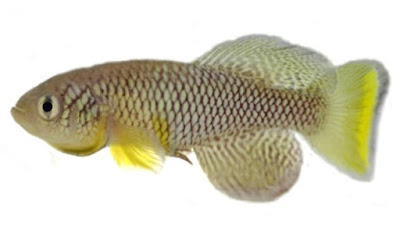Killifish Flusters Evolutionists
The killifish (three syllables, no need to think it kills things) is found in thousands of species and many families. Some colorful varieties are popular among aquarists. They get attention from Darwinists who get going on its adaptation supports evolution. Then creationists have to set them straight: adaptation is part of the Master Engineer's planning, and it did not turn into something else. Another aspect of certain killifish supports creation and is problematic for evolutionists.
Some varieties, such as the turquoise killifish, are annuals. (Personal difficulty time: I thought "annual" meant "every year", like Question Evolution Day is an annual event. When it comes to flowers and fish, annual means that something lives for a season or a year, and will not be back next year.) They have to breed in a special way, because they die off mighty quick-like, and killifish are often in ponds and such that dry up. Certain traits are unique to the annuals and their eggs, which could not evolve a bit at a time or the critter would be come extinct. More than that, there are annual killifish on different continents with the same traits! Evolutionists are flustered, but biblical creationists have a reasonable explanation.
 |
| Turquoise killifish image credit: Wikimedia Commons / Ugau (CC BY-SA 3.0) |
Researchers tend to use the turquoise killifish (Nothobranchius furzeri) for aging research. The reasoning behind this is the turquoise killifish has an incredibly short lifespan and maturity rate. A recent study found that Turquoise killifish reach sexual maturity in a mere two weeks. This is the fastest known maturation time of any vertebrate. The researchers pointed out how important this was since some of the seasonal pools they collected the turquoise killifish from dried up in as little as three weeks. Previous studies had shown these fish had a maximum lifespan of six months4 in captivity, so maturing quickly and producing offspring is critical to the survival of the species.To read the entire article, click on "Rapidly Reproducing Killifish Defy Evolution".